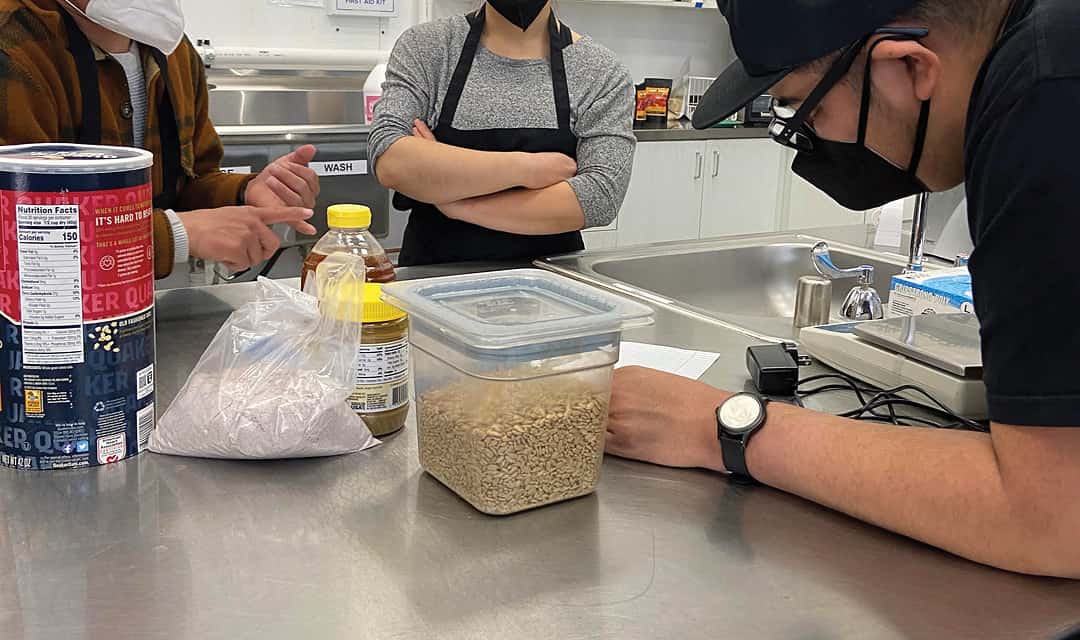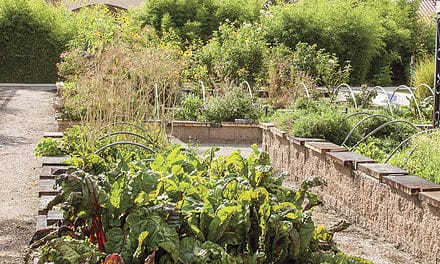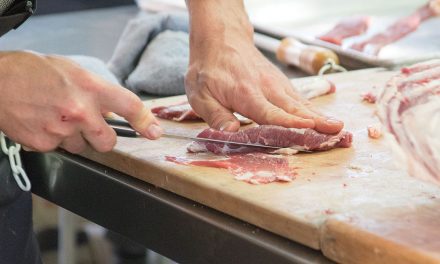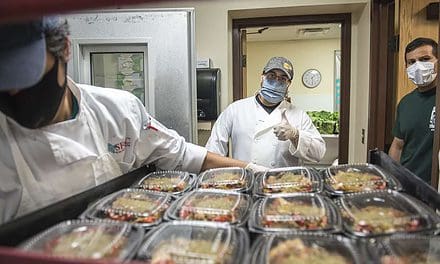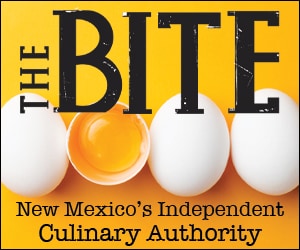Food Entrepreneurs Bridge Barriers with Shared Kitchen Spaces
by Cassidy A. Tawse-Garcia

Staff and participants talking formula in the Food Business Training Program at Three Sisters Kitchen.
Photo courtesy of Three Sisters Kitchen.
Among the many ways the pandemic shifted how we relate to each other, the business of food—making it, selling it, and eating it—was certainly not spared. In fact, partly because of the rise of people ordering takeout, shared kitchens, both as ghost kitchens and as community kitchens, have boomed. These shared kitchen spaces, and especially community kitchens, fill a much-needed gap in the food business landscape. Nationally, the demand for commercial kitchen space from businesses ranging from food trucks to producers of manufactured foods has never been higher. In New Mexico, Albuquerque saw a 60 percent increase in requests for food truck permits from 2020 to 2022.
You see, to serve food directly to the public requires not only licensing from local and state governments but also cooking space that meets the standards of a commercial kitchen. For new food business entrepreneurs, starting off can be daunting, with some internet sources claiming that 60 percent or more of restaurants fail within their first year of operation. (The National Restaurant Association puts that average at 30 percent.) Success rates are even lower for self-funded businesses and those founded by persons of color. So accessing affordable, clean, and safe kitchen space can make or break a new food business entrepreneur.
“Just doing what we do is a lot of work. So we are trying to take small, incremental steps as we can,” says Albuquerque food entrepreneur Nick Fitzgerald. Along with Bobby Nolan, Fitzgerald co-owns Sunday Bagels, a sourdough bagel pop-up that started as a “Sunday project” for friends. In a city with very few bagel shops, Fitzgerald saw a need and moved to fill it with flavors inspired by the terroir of New Mexico—like the blue corn lavender that “smells just like breakfast” and the green chile cheddar that uses juice from the roasting process to hydrate the dough.
“Albuquerque is a place where people are open to new ideas and open to people bringing ideas and art here,” says Fitzgerald, emphasizing that while he and Nolan are transplants to the city, they have found the community nothing but supportive. When Sunday Bagels expanded from serving friends to hosting weekly pop-ups at Gravity Bound Brewing, lines often stretched around the block before they even opened. They now make around 1,700 bagels in a weekend, selling from a booth at the Downtown Growers’ Market that, with its smells of toasted sesame and swarms of loyal customers, is impossible to miss.
To make this happen, Fitzgerald and Nolan work out of a commercial commissary kitchen in downtown Albuquerque that rents sectioned-off spaces to caterers, food truck operators, and other small business entrepreneurs. This works for them, in part because they usually begin their workday at 3 or 4 am, when no one else is there. In July, within two years of starting their business, Sunday Bagels announced that they’d signed a lease on a building. No opening date is announced yet, but the Albuquerque-grown bagel shop is intending to stick around, and they want their own brick-and-mortar space to do so.


Preparing lemongrass tofu samples and testing pH levels in the Food Business Training Program
at Three Sisters Kitchen. Photos courtesy of TSK.
Until recently, most of the shared kitchen spaces in New Mexico were concentrated in Albuquerque. There are standard commissary kitchens, like the one Sunday Bagels used to grow their business, that rent kitchen and prep space by the hour, offering locker-style storage for dry goods and equipment. There are also incubator-style kitchens, run by Three Sisters Kitchen and the South Valley Economic Development Center, which focus not only on providing cooking and manufacturing space but also on providing the business, marketing, and product development skills essential to launching a successful food business. These nonprofit kitchens can have long waiting lists, as the appeal of commercial kitchen space alongside food business education is high—and until this year, there was nothing remotely comparable in the state capital.
“That’s how it all started; I was getting really busy [as a private chef] and there was no commercial kitchen in Santa Fe,” says Andrea Abedi, a Culinary Institute of America graduate, first-level sommelier, and co-owner with Hilary Kilpatric of The Kitchen Table Santa Fe, the newest shared kitchen space to open its doors in New Mexico. With a soft opening in May 2023, the state-of-the-art cooking and event space took five years to come to fruition. Developed out of a business accelerator program in Santa Fe, bizMIX, The Kitchen Table has been a project of tenacity.
“People didn’t believe in us,” says Kilpatric as the duo give me a tour of the new kitchens and prep spaces, the wall-to-wall stainless steel gleaming. Many people thought that they would give up—among other challenges, they had to work with the City of Santa Fe to write a new building code, as no such commercial space had existed before. “What worked is that we didn’t [give up]. We found a way around, persevered, and we just kept taking the next right step,” says Kilpatric, whose background is in working with small artisan businesses to help them grow. “You can’t always see how you’re going to get to the end. . . . Sometimes you have to move at the micro levels, just keep taking the next right step and don’t give up.”

Event space at The Kitchen Table. Photo by Stephanie Cameron.
The space, a former high school, features three separate hot kitchens, two giant walk-in freezers, multiple cold storage spaces, ample dry food storage in its own room, a dehydrator, a classroom/event space with an open kitchen (in the former gymnasium), a courtyard that can be used for events, and even a space for employees to take a quick breather. With this state-of-the-art kitchen space, The Kitchen Table is giving a for-profit shared kitchen “accelerator” a go, buttressed with Abedi’s kitchen experience and Kilpatric’s business know-how. The kitchen is currently shared by seventeen food businesses, including Tender Fire Kitchen, Brie & Baguette, and Chef Dakota Weiss’s popcorn business, Dakota’s Pop Parlor.
“Just coming into the kitchen, [businesses] already have a leg up. As soon as you come into the kitchen and cook here, you can then sell to the public. Most private chefs, like I was doing, are cooking from home, and that really limits my ability to sell to the public. So right off the bat, by being members, they can extend their reach,” says Abedi. “We’re not an incubator, but we do have connections . . . I mean channels for how to get your food permit, how to get your food manager’s card, we can connect them with the economic department or health department—we’ve made a lot of those relationships, so we can make it easier for them, because it is overwhelming. It’s a mountain of paperwork.”
While Abedi and Kilpatric opted for a for-profit model, they’re a social enterprise. “We keep in mind the triple bottom line [people, prosperity, and planet],” Kilpatric says. They also consulted with nonprofit kitchens, including the Taos County Economic Development Corporation (TCEDC), as they worked to develop their membership model. The TCEDC, funded through the State of New Mexico Economic Development Department, is an example of a municipally supported incubator kitchen, and has heretofore been the shared kitchen resource in northern New Mexico. The kitchen is used by businesses across scale, from micro food businesses to global nonprofits; national disaster relief agencies used it to prepare food for residents and first responders in Mora County during the 2022 Calf Canyon / Hermit’s Peak Fire.

Commercial kitchen at The Kitchen Table. Photo by Stephanie Cameron.
From dried okra chips, homemade ice cream, tamales, pickles, and more, nonprofit “incubator” kitchens are not only creating a space for food businesses to sprout, but they are also providing the resources and training necessary for them to succeed. The Food Business Training Program at Three Sisters Kitchen (TSK) prepares New Mexico food business entrepreneurs by providing financial stability and a creative space for them to explore their business model and goals among an annual cohort of fellow entrepreneurs. The training program was founded to fill a very specific hole in the food landscape: when entrepreneurs have innovative business concepts that are held back by a lack of seed funding and training.
“Being in a cohort with other people that are trying to do this too felt really supportive,” says farmer and food advocate Anita Adalja, who graduated from TSK’s Business Training Program in 2022. “It is so rare we pursue business ventures as a group.” She came to the program because she was seeking an avenue to process excess harvests of okra from Ashokra Farm, which she co-owns with Ash Abeyta. Adalja had a solid idea of wanting to make a dehydrated okra product, but needed to learn more about recipe testing, as well as access to commercial-grade dehydrators, to make her product scalable.
“As a former grower myself,” says TSK’s food business training director Amanda Rich, “I know that there are these points of peak abundance, when many farms have the same crops available, and sometimes food prices can drop at market, or sometimes food waste happens. . . . At the opposite end of the season, growers may not have any income during winter months and consumers cannot source local products. Creating shelf-stable, value-added products not only solves issues around peak harvest but also creates an additional income stream for farmers that could provide income year-round.”
TSK’s annual program cohort is made up of food business entrepreneurs who want to make manufactured products. This can include hot sauces, dried jujubes, granola, and more. The cohort meets twice weekly from winter through spring, working on business plan development, recipe testing, sourcing, safe food handling, packaging, marketing, and distribution pathways. Graduates are given a stipend for marketing and accounting expenses, as well as use of the fully equipped TSK production kitchen for one year.
“The whole point of this [business training] program is not to launch a hundred businesses but really to create a space where people can experiment and decide ‘Is this what I want to do?’ without sinking their savings and going into debt. It’s a way to create an entry point with a lower amount of risk,” says Rich.
“The work I do at Ashokra is making okra accessible to all types of palates and sharing that love of okra with more people,” Adalja says. So her idea for making dehydrated okra chips—now available at tiny grocer ABQ, The Mouse Hole Cheese Shop, and at Ashokra’s booth at the Downtown Growers’ Market—came from a vision of wanting to see folks reaching for a crispy, salty snack version of this climate-adaptable vegetable.
Nina Simon, owner of Mud Honey, an ice-cream pop-up, is another graduate of TSK’s business training program. Where others were seeking to grow their food businesses to full-time operations, Simon works full time in nonprofit consulting and makes ice cream for the joy of it. “I like making beautiful food,” says Simon, whose delicate ice cream creations, from rosemary to salted caramel, feature flavors that speak to the seasons of the desert. The longtime Albuquerque resident spent years working in food service and coffee, and still finds her community in these spaces.
“I was shocked by the regulations,” says Simon, recounting all the ins and outs of licensing and permitting. “Especially as someone who is trying to make a product that people can access while also using really high-quality ingredients.” TSK played an integral role in helping her navigate the requirements so Simon could focus on what she loves: making ice cream. In the summer of 2022, she decided to ramp up her ice-cream business and start working half time at her day job. But the red tape of getting her business off the ground was frustrating, and this summer, she took a more focused approach, with Mud Honey ice cream featured in affogatos at Zendo and Slow Burn, and at monthly pop-ups at Gravity Bound Brewing. “There are so many hoops to jump around to even be able to do this,” she says.
Indeed, permitting food businesses is so complicated that Camille Vasquez of the South Valley Economic Development Center (SVEDC) refers to it as a journey—one that can be especially challenging for non-native English speakers and folks with limited computer skills. Still, Vasquez is quick to rattle off success stories from the SVEDC’s Mixing Bowl Incubation Program, which (along with their newer Mariposa program) also offers business training services alongside commercial kitchen space. Longtime Mixing Bowl participant Heidi Moir, who had been selling her gluten-free baked goods to coffee shops, recently opened her own storefront, The Bakehouse Off the Wheaten Path. Other success stories include Buen Provecho, who has been selling Costa Rican tamales and casados from a food pod at El Vado since 2018, and Las Golondrinas Pie Company, who recently moved into its own space inside Barelas Coffee House.


Left: Ashokra Farm okra crisps, photo courtesy of Ashokra Farm. Right: Bagel prep at Sunday Bagels commissary kitchen, photo courtesy of Sunday Bagels.
All new businesses present risk, and food businesses can be especially vulnerable. Yet the market for packaged food in the United States was estimated at $1.03 trillion in 2021. A New Mexico Department of Agriculture report released in March 2023 found that the US food and agriculture sector “directly supports nearly 23 million jobs, provides $927 billion in wages, and is particularly vital to rural communities across America.” So while the risk is high, the market is there, and food entrepreneurs continue to jump in. For farmers, bakers, and micro-producers alike, having the resources to start out and the space to make fresh food and value-added products safely (and legally) is essential to increasing their chances of success.
Not every entrepreneur opts for the supportive incubator kitchen model. Some, like Sunday Bagels, prefer to self-fund and go the more traditional commissary route to secure space to cook. Others, like Mud Honey, are in it to make something delicious but not necessarily to fully support themselves from their food pursuits. For many entrepreneurs, the extensive permits and licensing required to operate can be enough to shut them down before their idea is even launched. In response, shared kitchen spaces are growing in New Mexico. Not only are they in high demand, but without them, the entry point to begin a food business would be too high for most. As Rich of TSK puts it, “If we want to start thinking about deep sustainability for our community and the farmers we rely on, we need to consider food preservation and manufacturing as a viable pathway to arrive there.”

Cassidy Tawse-Garcia
Cassidy Tawse-Garcia is a storyteller, cook, and food justice advocate living in Albuquerque. Hailing from Colorado, she grew up on a small family farm, growing vegetables and flowers for market and community supported agriculture. Early in the COVID-19 pandemic, she started Masa Madrina (an ode to her great-aunt, a native of Arroyo Hondo), a prepared-food business focusing on sourdough and farm-sourced seasonal offerings, as a means to survive. Today, her work has evolved to focus on mutual aid and elevating marginalized voices in food justice and farming. She is currently pursuing her PhD in human geography at the University of New Mexico, where she studies community reciprocity and care movements.

